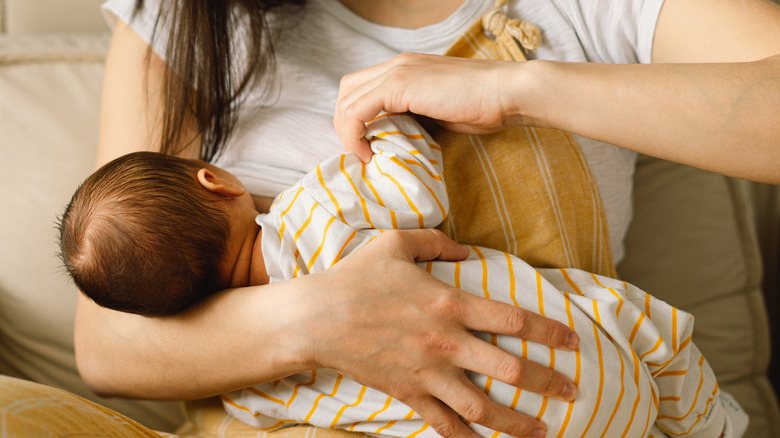How Hypoglycemia Can Affect Your Body After Giving Birth
If you have diabetes, you might need to take a little more care of your blood sugar levels after giving birth. Your body is more sensitive to hypoglycemia, or low blood sugar, after delivering a baby, making it a crucial time for maintaining steady blood glucose levels (via Spectrum Health Lakeland Diabetes and Endocrinology).
When your blood sugar is low, symptoms can include shakiness, sweating, headache, nausea, fatigue, irritability, and dizziness. If it isn't treated and gets worse, hypoglycemia can lead to blurry vision, slurred speech, abnormal behavior, confusion, and loss of coordination.
If you have diabetes, this could be due to taking too much insulin or another medication to counteract high levels of blood sugar, per the Mayo Clinic. It could also happen if you exercise more than you usually do or don't eat as much as usual after taking your medication. If you don't have diabetes, hypoglycemia is not as common. But it could be possible if you drink heavily without eating enough food, experience malnutrition due to a condition such as anorexia nervosa, or have a severe illness such as kidney disease or hepatitis.
Managing blood sugar after having a baby
After giving birth, your body becomes more sensitive to insulin (via Spectrum Health Lakeland Diabetes and Endocrinology). Insulin is the hormone created by the pancreas that allows the cells to take in sugar to be used as fuel. Immediately after you've had a baby, your body's need for insulin drops significantly, which can lead to hypoglycemia. So if you take too high a dose of insulin in those first few days after giving birth, your blood sugar could plummet. Breastfeeding is similar in that it makes your body more sensitive to insulin.
Make sure you have snacks on hand that can raise your blood sugar quickly, such as juice, hard candy, honey, or glucose gel. If you're breastfeeding, have a small snack beforehand. Be sure to check in with your healthcare provider within two weeks of giving birth for a diabetes checkup.
Those with diabetes can also be more at risk for postpartum depression, according to the American Diabetes Association. Having a baby can be extra overwhelming when combined with also managing diabetes. Be sure to tell your doctor immediately if you're having trouble adjusting, are overwhelmed with feelings of sadness, or are having any thoughts of harming yourself or your baby.
If you or someone you know needs help with mental health, please contact the Crisis Text Line by texting HOME to 741741, call the National Alliance on Mental Illness helpline at 1-800-950-NAMI (6264), or visit the National Institute of Mental Health website.


